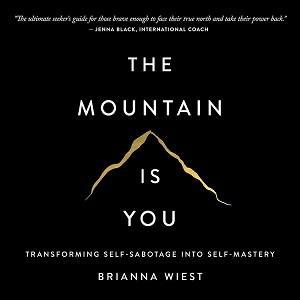The Mountain Is You: Transforming Self-Sabotage into Self-Mastery by Brianna Wiest is a deeply insightful book that delves into the psychological and emotional patterns that lead to self-sabotage and how we can overcome them to achieve self-mastery. Below are 14 lessons from the book:

Read: Big Magic
1. Understanding Self-Sabotage
Self-sabotage is one of the central themes of the book. Wiest explains that self-sabotage occurs when our subconscious mind acts against our conscious goals and desires. This behavior is often rooted in deep-seated fears, limiting beliefs, and unresolved trauma. Understanding that self-sabotage is not a reflection of laziness or lack of willpower but a complex psychological mechanism is the first step toward overcoming it.
2. The Power of Self-Awareness
Wiest emphasizes the importance of self-awareness as a tool for transformation. Self-awareness allows you to recognize patterns of self-sabotage, identify their triggers, and understand the underlying causes. By becoming aware of these patterns, you can begin to interrupt them and choose different responses that align with your true goals.
3. Embracing Discomfort for Growth
One of the key lessons Wiest teaches is that growth often requires stepping outside of your comfort zone. Discomfort is a natural part of change, and avoiding it can lead to self-sabotage. By embracing discomfort, you open yourself up to new experiences and opportunities for personal growth, allowing you to overcome the internal barriers that hold you back.
4. Rewriting Your Narrative
The stories we tell ourselves shape our reality. Wiest encourages readers to examine the narratives they have internalized—about who they are, what they deserve, and what they are capable of. By rewriting these narratives in a way that reflects your true potential and desires, you can change the way you see yourself and your future.
5. Understanding the Role of Fear
Fear is often at the heart of self-sabotage. Wiest explains that fear of failure, fear of success, and fear of the unknown can all lead to behaviors that undermine your progress. Understanding the role of fear in your life and learning how to manage it is crucial for overcoming self-sabotage and achieving self-mastery.
6. The Importance of Emotional Resilience
Building emotional resilience is essential for overcoming self-sabotage. Wiest discusses how emotional resilience allows you to navigate setbacks, disappointments, and challenges without resorting to self-sabotaging behaviors. Developing resilience involves learning to process emotions in a healthy way and maintaining a positive mindset even in difficult situations.
7. Aligning Actions with Intentions
A critical aspect of overcoming self-sabotage is ensuring that your actions are aligned with your intentions. Wiest emphasizes the importance of consistency between what you say you want and what you actually do. This alignment creates momentum and builds confidence, helping you to break free from self-sabotaging cycles.
8. Developing a Growth Mindset
Wiest advocates for adopting a growth mindset, which is the belief that your abilities and intelligence can be developed through effort and learning. A growth mindset helps you to view challenges as opportunities rather than threats, reducing the likelihood of self-sabotage. This mindset shift is key to unlocking your potential and achieving long-term success.
9. The Power of Positive Habits
The book emphasizes the role of positive habits in transforming self-sabotage into self-mastery. Wiest discusses how small, consistent actions can lead to significant changes over time. By focusing on building habits that support your goals, you can gradually replace self-sabotaging behaviors with empowering ones.
10. Practicing Self-Compassion
Wiest highlights the importance of self-compassion in the journey to self-mastery. Self-compassion involves treating yourself with kindness and understanding, especially when you make mistakes or face setbacks. By practicing self-compassion, you can reduce the harsh self-criticism that often leads to self-sabotage and instead foster a more supportive and nurturing inner dialogue.
11. The Role of Environment in Behavior Change
Your environment plays a significant role in shaping your behaviors. Wiest encourages readers to assess their surroundings and make changes that support their goals. This might involve creating a more organized workspace, surrounding yourself with positive influences, or eliminating distractions that trigger self-sabotage.
12. Embracing Accountability
Accountability is a powerful tool for overcoming self-sabotage. Wiest suggests finding ways to hold yourself accountable, whether through self-monitoring, sharing your goals with others, or working with a coach or mentor. Accountability helps you stay on track and provides motivation to continue making progress even when challenges arise.
13. Understanding the Importance of Rest
Wiest also emphasizes the need for rest and recovery as part of the journey to self-mastery. Overworking and neglecting self-care can lead to burnout, which often triggers self-sabotaging behaviors. By prioritizing rest and taking care of your physical and mental health, you can maintain the energy and focus needed to achieve your goals.
14. The Journey to Self-Mastery
The final lesson in the book is that self-mastery is an ongoing journey rather than a destination. Wiest encourages readers to view their personal development as a continuous process of growth and learning. By committing to this journey and applying the principles discussed in the book, you can transform self-sabotage into self-mastery and live a more fulfilling life.
Conclusion
The Mountain Is You: Transforming Self-Sabotage into Self-Mastery by Brianna Wiest offers valuable insights into the psychological and emotional barriers that prevent us from reaching our full potential. By understanding the roots of self-sabotage and applying the lessons outlined in the book, you can begin to overcome these obstacles and achieve greater self-mastery (Amazon).


